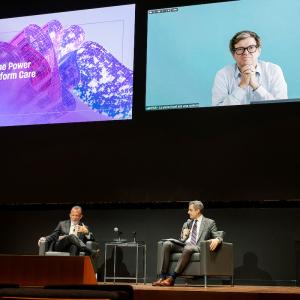
Nancy Sanchez is the senior vice president and vice dean of human resources and organizational development and learning at NYU Langone Health.
Photo: NYU Langone Staff
During the past decade as the senior vice president and vice dean of human resources and organizational development and learning at NYU Langone Health, Nancy Sanchez has overseen a period of unprecedented growth at the institution. The number of employees has quadrupled from 9,000 in 2008 to 37,000 in 2018, making NYU Langone one of the nation’s fastest-growing medical centers. Last spring, Sanchez spoke to first-year medical students about what she’s learned during her 36 years with the organization. The conversation was part of NYU School of Medicine’s Leaders and Teams lecture series. Here are a few highlights.
Look for learning opportunities. I started at NYU Langone as a recruiter. I knew the best way to evolve into a leader was to work in each area of human resources, but also to go beyond that. I had to learn about medicine and some of the nuances that were not addressed in the employee handbook—the politics, the personalities, and so forth.
Use your observational skills. You need to understand what makes an organization work, and that involves listening, watching, and observing. When you attend meetings, when you have conversations, note what happens between people. Because that’s how you master interpersonal dynamics.
Find mentors you trust. I was fortunate to find people who allowed me to feel comfortable expressing opinions that differed from theirs. We’d sometimes have fierce debates, and it taught me how to present information and advocate for others. I’d recommend seeking out a mentor who’s different from you and who will provide feedback and perspective that you wouldn’t otherwise get from your circle of friends.
Criticism can be more helpful than praise. One of the first things Dean Grossman asked me when he was appointed was, “How am I doing?” I said, “Oh, we’re doing well.”
And he responded, “No, don’t tell me what I’m doing well. Tell me what I’m not doing well, because that affords me the greatest opportunity to improve.” He has been consistent about that ever since. When he makes a mistake, I tell him, and he’s open to the feedback, even if he doesn’t agree.
One size doesn’t fit all. To be successful, you need to know how to use different communication and engagement styles to reach a variety of people. The wrong approach won’t get the outcome you want.
Don’t lose sight of what really matters. I tell employees all the time, “It is all about the patient. That’s why we’re here.”
Be true to yourself. I’ve been told I don’t look Hispanic, and I’ve had to prove I am to those within the Hispanic community because some people can’t see past stereotypes. I’ve also had people discriminate against me because of my ethnicity. So I’ve seen it from both sides. My advice: You have to feel comfortable in your own skin. There will always be biased people out there, those who are quick to judge the limits of your ability. But you should not allow that to deter you from getting where you want to be.
Managing is part of the job. Most physicians will deal with employee behavioral issues at some point. If you do that effectively, it won’t become a distraction.
If you don’t, even in a small practice, it will consume your time. Take advantage of the many opportunities along the way to educate yourself about leading and motivating others. It’s critically important for whatever your future holds.
Tune out the noise. Forget about what other people are saying—that can hold you back from being the best at what you do. Above all, simply focus on a goal and pursue it. Don’t let anybody stop you.

